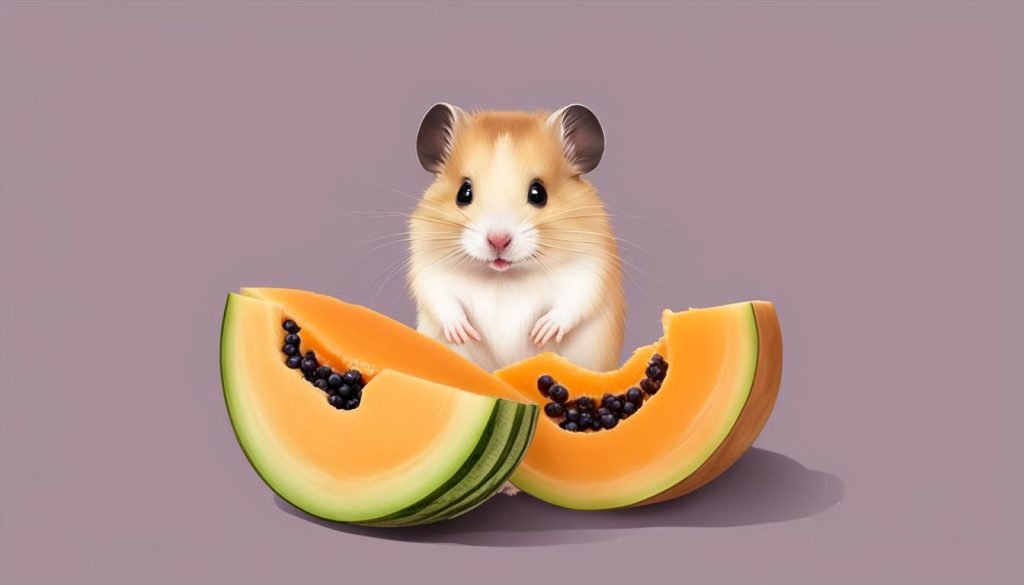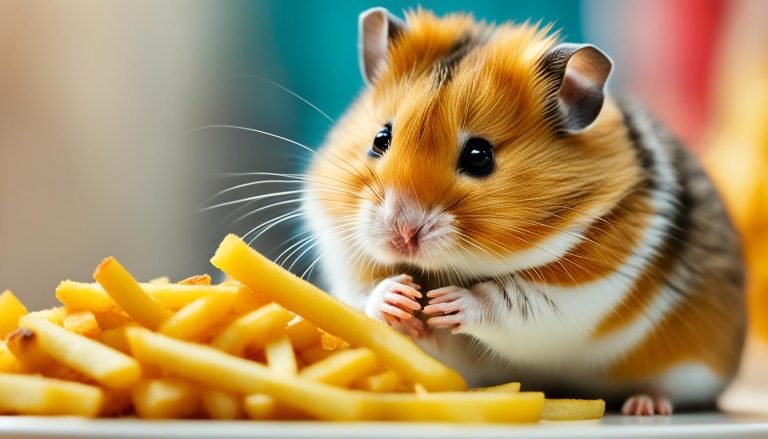Can Hamsters Eat Cantaloupe? Find Out
Hello, fellow hamster owners!
If you’re wondering whether it’s safe for your adorable little furry friend to munch on cantaloupe, you’ve come to the right place.
As a hamster lover myself, I understand the importance of providing our tiny companions with a balanced and nutritious diet.
Let’s delve into the topic of hamsters and cantaloupe to ensure we make the best choices for our beloved pets.
Key Takeaways:
- Hamsters can safely eat cantaloupe, but it should be given in moderation.
- Cantaloupe offers benefits such as vitamins A, B6, and C, and fiber.
- Feeding too much cantaloupe can lead to short-term effects like diarrhea and long-term effects such as obesity and diabetes.
- The appropriate amount of cantaloupe for adult hamsters is about 1 teaspoon, no more than twice a week.
- Certain types of hamsters should not eat cantaloupe due to their predisposition to diabetes.
The Benefits of Cantaloupe for Hamsters

When it comes to the nutritional needs of hamsters, incorporating a variety of fruits and vegetables into their diet is essential. Cantaloupe, in particular, offers numerous benefits for hamsters, providing them with a rich dose of vitamins and nutrients.
Cantaloupe is a powerhouse of vitamins, including vitamins A, B6, and C, all of which play vital roles in maintaining a hamster’s health. Vitamin A, also known as retinol, is essential for promoting healthy eyesight and boosting the immune system. Additionally, vitamin B6 aids in proper growth and development, supporting a hamster’s overall well-being.
One of the standout qualities of cantaloupe is its high vitamin C content. As a potent antioxidant, vitamin C strengthens the immune system, helping hamsters fight off illnesses and infections. This vitamin also supports the production of collagen, which is crucial for maintaining healthy skin, fur, and other connective tissues in hamsters.
Furthermore, cantaloupe is packed with fiber, which promotes healthy digestion for hamsters. Fiber helps regulate bowel movements and prevents gastrointestinal issues in these small pets. Additionally, the natural sugars in cantaloupe provide a quick source of energy for hamsters during playtime and exploration.
However, it is important to remember that while cantaloupe offers numerous benefits, it should be given to hamsters in moderation. Too much cantaloupe can lead to digestive upset and even health issues such as obesity and diabetes. A teaspoon-sized serving of cantaloupe offered no more than twice a week, is sufficient to provide hamsters with the benefits of this delicious fruit.
How Much Cantaloupe Can Hamsters Eat?
When it comes to feeding cantaloupe to your hamster, it’s important to be mindful of the serving size. The appropriate amount of cantaloupe for an adult hamster is about 1 teaspoon, and it should be given no more than twice a week. This portion size ensures that your hamster receives the nutritional benefits without consuming too much sugar or water content that may lead to health issues.
However, it’s essential to note that baby hamsters should not be given cantaloupe due to their underdeveloped digestive systems. Their delicate systems may struggle to process this fruit properly, leading to digestive distress. It’s best to wait until they are older and their digestive systems are more developed before introducing cantaloupe into their diet.
Furthermore, not all types of hamsters can safely consume cantaloupe. Certain breeds, such as the Chinese hamster, Russian Campbell dwarf hamster, and Winter White dwarf hamster, are more prone to diabetes. These hamsters should avoid cantaloupe as it can exacerbate their risk of developing this condition.
When introducing cantaloupe to your hamster’s diet, it’s essential to do so gradually. Start with a small amount and monitor their response. If any signs of digestive distress, such as diarrhea or bloating, occur, discontinue feeding cantaloupe immediately.
By following these guidelines and being mindful of the safe amount of cantaloupe for hamsters, you can ensure that your furry friend enjoys this tasty treat without any adverse effects on their health.
Precautions When Feeding Cantaloupe to Hamsters
While cantaloupe can be a beneficial treat for hamsters, it is important to take certain precautions when including it in their diet. Here are some essential guidelines to follow:
- Do not give cantaloupe seeds to hamsters: Cantaloupe seeds can be sharp and pose a choking hazard for hamsters. It is crucial to remove all seeds before offering cantaloupe to your furry friend.
- Avoid the skin or rind of the cantaloupe: The skin or rind of the cantaloupe may contain chemicals and bacteria that can be harmful to hamsters. It is best to peel the cantaloupe and only offer the flesh to your pet.
- Avoid offering cantaloupe juice: High sugar content in cantaloupe juice can be difficult for hamsters to process. Stick to giving them fresh cantaloupe slices instead.
Taking these precautions will help prevent any potential risks and ensure that your hamster enjoys cantaloupe safely. Remember, moderation is key to maintaining a healthy and balanced diet for your furry friend.
Final Thoughts
In conclusion, feeding cantaloupe to hamsters can be a great way to provide them with a tasty and nutritious treat. Cantaloupe is rich in important vitamins and minerals that can support their overall health and well-being. However, it is essential to exercise caution and follow certain guidelines to ensure the safety of your furry friend.
When offering cantaloupe to hamsters, remember to give it in moderation. Excessive consumption can lead to short-term problems like diarrhea and long-term issues such as obesity and diabetes. It is best to offer cantaloupe as an occasional treat rather than a regular part of their diet.
Additionally, be mindful of portion sizes and do not feed your hamster the seeds, skin, or juice of the cantaloupe. The seeds can pose a choking hazard, while the skin and juice may contain chemicals and bacteria that can harm their delicate digestive systems.
By following these precautions and introducing cantaloupe gradually, you can safely incorporate this delicious fruit into your hamster’s diet. Enjoy watching your furry companion relish in the flavors and reap the nutritional benefits of this refreshing treat.
Similar Posts:
- Can Hamsters Eat Avocado? Diet Safety Tips
- Can Hamsters Eat Pineapple? Safe Snack Guide
- Can Hamsters Eat Green Beans? A Complete Guide
- Can Hamsters Eat Blackberries? Safe Treat Tips
- Can Hamsters Eat Popcorn? Safe Snack Tips
- Can Hamsters Eat Salami? Here’s Why Vets Say No

Author: Vanessa G.
Vanessa is a writer and a true animal enthusiast. She has a Bachelor’s Degree in Animal Health and Behavior, and Wildlife Conservation. In her home, she shares her life with two dogs, a cat, and a hamster. Through her writing and daily interactions with animals, Vanessa is on a mission to share the beauty and importance of our animal companions.







